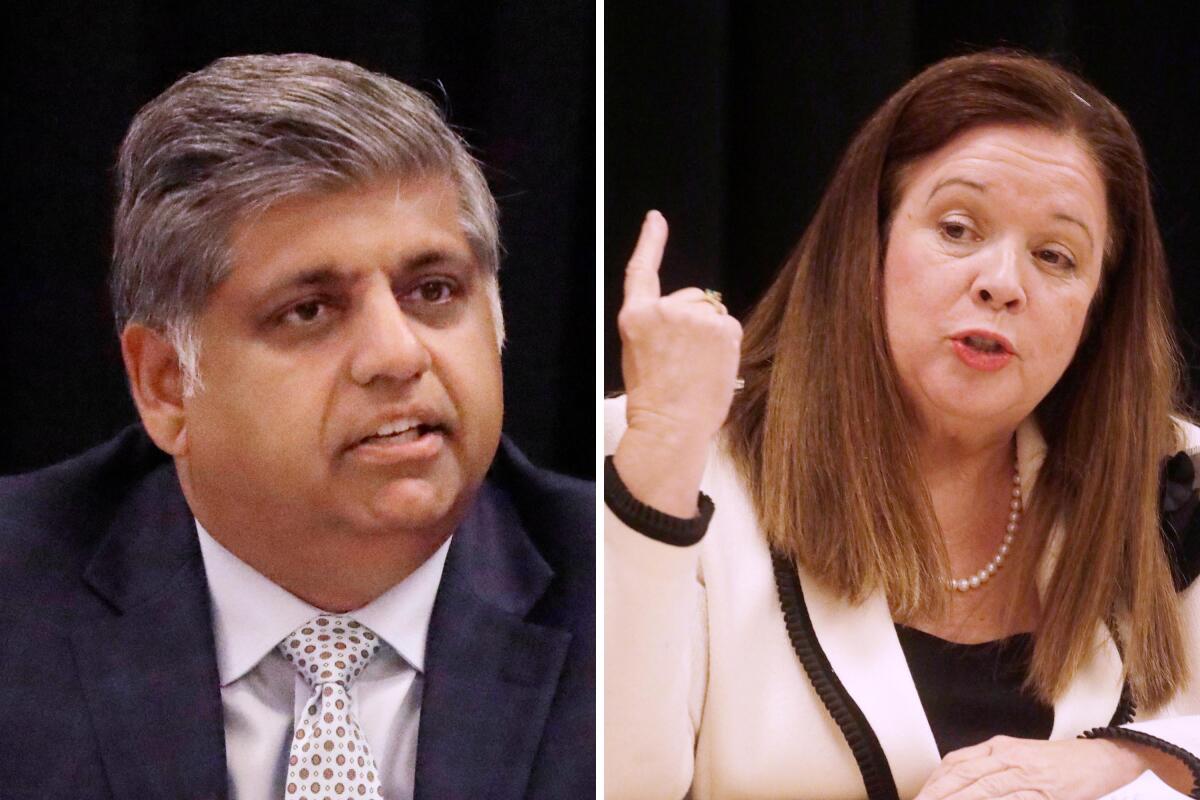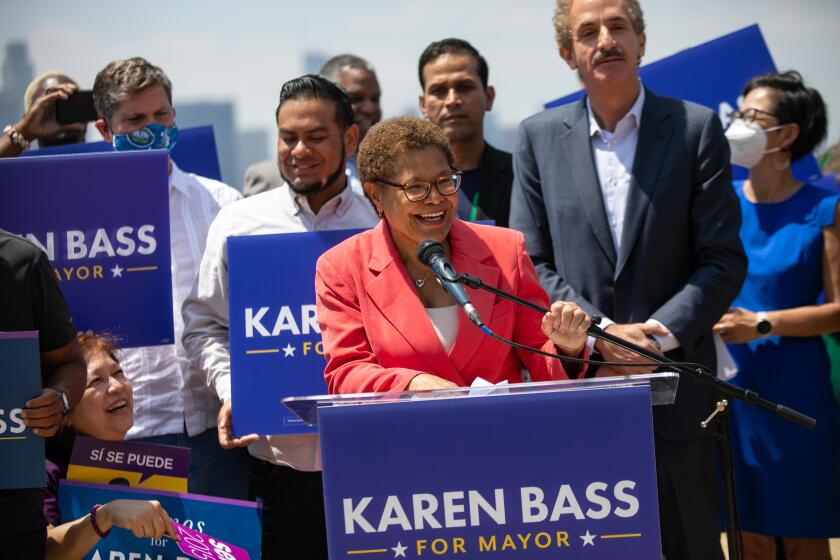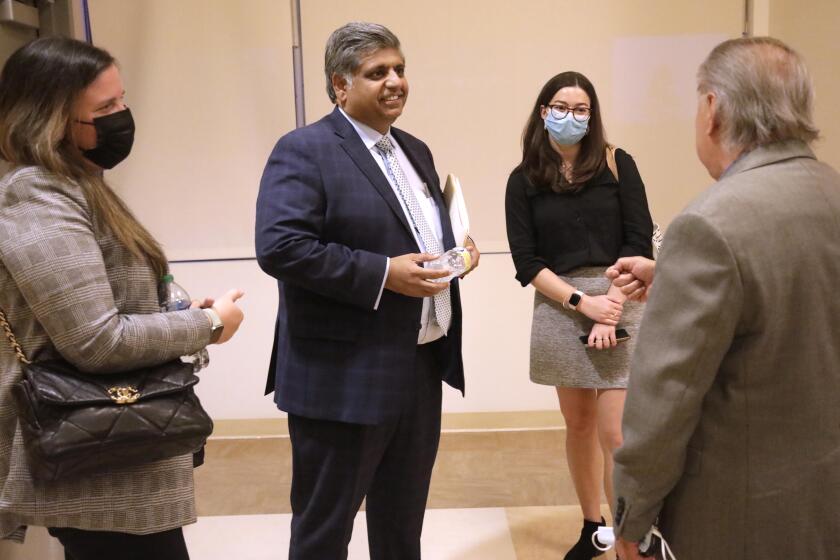Two outsider candidates vie to become L.A. city attorney

- Share via
The lawyers competing to replace L.A. City Atty. Mike Feuer are relative neophytes to the world of city politics, outsider candidates who have laid out vastly different visions for how they plan to lead the city.
Civil rights attorney Faisal Gill, who finished a few percentage points ahead of his opponent in the primary, has campaigned as a progressive reformer who would hold the Los Angeles Police Department accountable and impose a 100-day moratorium on filing charges on misdemeanor crimes, to allow time to study whether to permanently cease prosecuting certain offenses.
“The City Hall establishment is nervous and they should be,” he said in an interview. “It’s not going to be business as usual with me.”
His opponent, finance law attorney Hydee Feldstein Soto, has positioned herself as a pragmatic leader with extensive managerial experience, who — unlike Gill, who previously ran for office as a Republican — is a lifelong Democrat and has publicly pledged not to run for any other elected office in the future.
“This is not, to me, a political job. This is a job of competence,” she said in an interview. “You need a lawyer who wants to be a lawyer.”
It’s the city attorney’s job not only to prosecute misdemeanor crimes in Los Angeles, but also to offer legal advice to the mayor and City Council and to defend the city and its departments in lawsuits filed against them — an inherently complicated combination of roles, said Loyola Law School professor Jessica Levinson.
Meet the candidates: Civil rights lawyer Faisal Gill and finance law attorney Hydee Feldstein Soto
“A prosecutor’s office and defense firm and a legal advising firm all rolled into one,” she said. “So many tentacles in the city’s business.”
And because the job is sprawling and less forward-facing than many other elected positions, voters often don’t know exactly what the city attorney does, said Raphael J. Sonenshein, executive director of the Pat Brown Institute for Public Affairs at Cal State L.A.
“It’s an oddly low-visibility campaign,” he said, adding that in races such as this one in which neither candidate has high name recognition, voters often look to the candidates’ ideological positions and endorsements.
Gill, who according to L.A. City Ethics Commission filings has loaned his campaign more than $1.5 million, has been endorsed by several national and local leaders, including Rep. Ilhan Omar of Minnesota, L.A. County Board of Supervisors Chair Holly Mitchell and L.A. City Councilmember-elect Eunisses Hernandez. Feldstein Soto has been endorsed by several city and county leaders, as well as the L.A. County Democratic Party, the union that represents deputy city attorneys and four of her challengers from the primary race.
Both candidates recently weighed in on the revelation of explosive recordings that captured L.A. councilmembers using racist language in a discussion about the city’s redistricting process.
A few hours after the news broke, Gill posted a tweet calling on then-council President Nury Martinez to “resign immediately.” If elected, he said, he would launch an investigation into the redistricting process on his first day in office.
“Racism and corruption,” he wrote, “will not be tolerated in our government.”
Soon after, Feldstein Soto tweeted saying that the leaders had exhibited “blatant racism” and that “for the good of our City, these individuals should make way for new leaders.” She called on California Atty. Gen. Rob Bonta to investigate the local redistricting process. (Later in the week, Bonta announced he had launched an inquiry.)
Karen Bass withdrew her endorsement for Faisal Gill’s city attorney campaign.
While the city attorney’s race itself has maintained a relatively low profile, it has grabbed headlines a few times since the primary, including when the race got pulled into a proxy battle between the city’s mayoral candidates.
A few weeks after the June primary, the State Bar of California briefly placed Gill’s law license on inactive status, stemming from what he characterized as “a small administrative oversight.” He publicly took responsibility and his status was reactivated after he paid a reinstatement fee.
Around that same time, mayoral candidate Rick Caruso, who has campaigned on L.A.-isn’t-safe rhetoric, attacked his opponent, Rep. Karen Bass, who endorsed Gill several months earlier, calling him a friend who she knew would be “a fighter for progressive policies.”
“Why is Karen Bass supporting D.A. Gascón and City Attorney candidate Faisal Gill?” read an email from the Caruso campaign in mid-July that highlighted Gill’s 100-day moratorium.
Three days later, Bass tweeted a statement from her campaign saying she disagreed with the proposed moratorium and had taken the unusual step of withdrawing her endorsement. (A version of Gill’s plan was publicly displayed on his website for several months before she withdrew her endorsement.)
In response, Gill, who has said the moratorium would exclude “particularly egregious or time-sensitive” crimes, released statements accusing Caruso of using “fear-mongering tactics” and saying that he was proud to support Bass’s mayoral run.
The son of a cab driver father and a mother who worked in retail, Gill, who was 8 when his family emigrated from Pakistan to Virginia, eventually went on to study law in Washington, D.C.
He later joined the U.S. Navy as an officer in the Judge Advocate General’s Corps and worked as a senior policy advisor in the Department of Homeland Security under then-President George W. Bush. In 2006, he spoke out publicly against a marriage equality amendment in Virginia (he has since apologized) and the next year he ran unsuccessfully as a Republican for a seat in that state’s House of Delegates.
Gill described the matter as “a small administrative oversight on my part.”
But his political views soon evolved — a transformation spurred, he said, by discrimination he faced as a Muslim in the party — and he became a “staunch Democrat.” Now, he’s positioned further to the left than many other leaders in the party.
“I’ve had Karen Bass take her endorsement away from me for my progressive policies,” he said.
Asked about the 100-day moratorium — a review period, as he calls it — Gill said it’s past time for bold reform.
“We need to change the way we deal with misdemeanors in Los Angeles,” he said. “It’s very clear that if you want public safety, the old ways of ‘lock ’em up’ doesn’t work.”
Gill has thought about some misdemeanors he may stop prosecuting — public intoxication, jaywalking, loitering and solicitation among them — but said he plans to use the 100 days to meet with lawyers in his office, defense attorneys and members of the Los Angeles Police Department to get their input.
“I’ll give everyone a chance to be at the table,” he said, adding that he doesn’t think it makes sense to file charges during the review period.
To combat the housing and homelessness crises, Gill said he plans to crack down on people violating the city’s rules for short-term rentals through sites such as Airbnb, a move he said would increase the city’s housing stock and lower rent prices. He has also said he believes Section 41.18 of the municipal code — the anti-camping law enacted last year by the City Council — is immoral and unconstitutional.
“I’m not going to enforce it,” he said.
Levinson, the law professor, said although it would be an unusual situation, she couldn’t think of an entity that could compel him to file such cases — a testament, she said, to the broad discretion granted to prosecutors.
“It’s like a de facto overturning of the ordinance,” she said. “The city attorney can essentially decide to make it dead letter.”
Gill’s decision to run for city attorney was motivated, in part, by his experience litigating against the office while representing one of his clients, Antone Austin, a Black man arrested by Los Angeles police in 2019 during a search for a white suspect.
At a candidate forum during the primary, Gill spoke directly to the police force. “I will hold you accountable,” he told them — a vow that experts say could prove complicated because, as city attorney, he’s charged with advising and defending the department in litigation.
But Gill sees no conflict, saying proactive steps will protect the city against future lawsuits.
“I’m the lawyer for the department,” he said, “so if officers are acting inappropriately or illegally, I view it as protecting LAPD as a whole to root out the bad officer.”
Gill said he believes his previous experience working in government, as well as his current work as a civil rights attorney, makes him better prepared for the role than his opponent.
“Between the two of us,” he said, “I’m the only one who goes to court and does criminal law.”
Born and raised in San Juan, Puerto Rico, Feldstein Soto has said on the campaign trail that her identity — “a Jewtina,” she calls herself, an amalgam of Jewish and Latina — shapes her values as a leader, which she has said include justice, collaboration and transparency.
Following in the footsteps of her father, Stanley L. Feldstein, a legal titan known for his role in helping to close a notoriously dangerous and dilapidated jail in Puerto Rico, Feldstein Soto decided to pursue a legal career.
After graduating from law school in New York, she was eager to escape bitter winters and began applying for jobs in Los Angeles, where she moved in 1982. She worked for several years as a litigator and bankruptcy lawyer and built an expertise in financial law overseeing multibillion-dollar public deals.
Her top priorities as city attorney, she said, would be homelessness, public safety and transparency.
She has laid out a multi-point plan for addressing homelessness, including streamlining the building approval process and scrutinizing the city’s contracting practices to lower the costs of homeless housing.
“We have got to start hitting this on all cylinders,” she said.
While she has said she would work to standardize the enforcement of 41.18 across the city, Feldstein Soto has said she believes the ordinance is constitutional, so long as people are given a credible offer of housing or shelter. Asked about her opponent’s proposed 100-day moratorium, she called the plan “absurd.”
“You might as well take a bulletin board and say, ‘Bad guys from all over the world, please come to Los Angeles. You’ve got 100 days to go wild,’ ” she has said.
Feldstein Soto said her professional experience overseeing complex deals and managing teams of lawyers make her the best candidate for the role. It’s time, she said, for a transactional lawyer — instead of a litigator— to lead the office.
“We’ve never had somebody who can actually draft their way out of a paper bag, who can deal with 240-page loan agreements,” she said. “That’s some of what our city needs to make it work.”
Her decision to run was motivated by a desire to help the city she loves but believes is in a serious slump — she couldn’t move away, she told herself, without trying to help fix it.
“I think the city is a mess,” she said, before evoking a common line she’s used on the campaign trail. “The only thing that has improved since 1982 is that the haze isn’t as bad.”
In interviews, both candidates described the state of L.A. in a single word.
“Divided” she said; he said “troubled.”
More to Read
Sign up for Essential California
The most important California stories and recommendations in your inbox every morning.
You may occasionally receive promotional content from the Los Angeles Times.














